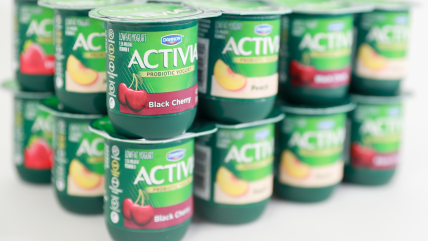
Danone has reached an agreement to settle a lawsuit with a coalition of NGOs in France around its use of plastics.
ClientEarth, Surfrider Foundation Europe and Zero Waste France launched legal proceedings against the French dairy and drinks giant in January 2023, claiming Danone was not doing enough to reduce its use of plastic across its supply chain.

Discover B2B Marketing That Performs
Combine business intelligence and editorial excellence to reach engaged professionals across 36 leading media platforms.
The three groups called for greater transparency from the Paris-headquartered company on its plastic footprint and a ‘de-plastification’ plan.
In 2022, the three NGOs had already sent legal warnings to the Evian bottled water maker, alongside the French arms of Nestle and McDonald’s, regarding “alleged inadequate acknowledgement and management of plastic pollution” in their businesses.
The coalition filed its lawsuit in 2023 at the Judicial Court of Paris, in which it said Danone must comply with the French duty of vigilance law, which holds large corporations to account over their environmental impact.
Under the agreement established on Friday (21 February), Danone said it is “reinforcing the vigilance plan” by providing “a more detailed description of the consequences of the use of plastic packaging”.

US Tariffs are shifting - will you react or anticipate?
Don’t let policy changes catch you off guard. Stay proactive with real-time data and expert analysis.
By GlobalDataIt said it had also provided information on the “actions” it was enforcing in relation to plastic packaging use, which include “reducing, reusing, recycling, and recovering plastic packaging”.
The Activia yogurt maker added that the conversation with ClientEarth, Surfrider Foundation Europe and Zero Waste France had been “open and transparent” and that it was “beneficial and conducive to tackling the complex challenges that require a uniting of all the actors’ and stakeholders’ strengths”.
In a separate statement, ClientEarth noted that Danone had agreed to four commitments, which also include improving its policy for “mitigating and preventing the risks associated with the use of plastic, in particular the implementation by Danone of reuse solutions”.
Commenting on the news, Kamila Drzewicka, spokesperson for the NGO coalition said: “Two years ago, we noticed that Danone’s strategy, focused exclusively on recycling, was in our opinion inadequate. To prevent the risks associated with the use of plastic, companies must do everything possible to reduce its use.
“For a company like Danone, where the majority of the plastic identified comes from packaging, this involves the development of bulk and reuse solutions. But only a complete and transparent plastic assessment will make it possible to assess the impact of the group’s actions to deplastify.”
The French food and drinks giant has also committed to releasing details on its plastic footprint and holding annual meetings until 2027 with ClientEarth, Surfrider Foundation Europe and Zero Waste France.
Drzewicka added: “We will continue to discuss with Danone and will remain attentive to the ways the company continues to reduce the presence of plastic throughout its value chain and activities, whether in the context of pilot projects in the field of bulk and reuse or in terms of plastic packaging management.”
Another coalition spokesperson, Bénédicte Kjær Kahlat, described the new “vigilance plan” as “for the first time” being able to show “the risks linked to the production and use of certain plastics and additives likely, due to the migration of sensitive substances, to generate impacts on human health throughout the life cycle of plastics”.
While the agreement is undoubtedly good news for both sides, Kjær Kahlat cautioned that “we remain extremely attentive to ensuring that manufacturers prioritise that plastic is not replaced by other single-use materials: setting up systems for reusing packaging and reducing, without substitution, are the best ways to combat plastic pollution”.





